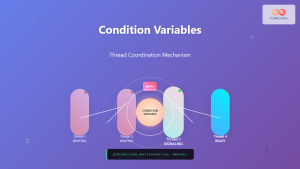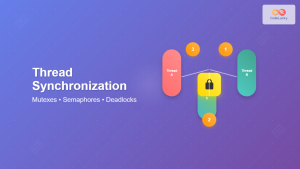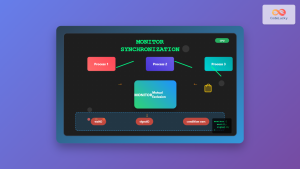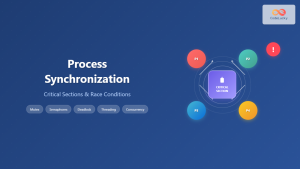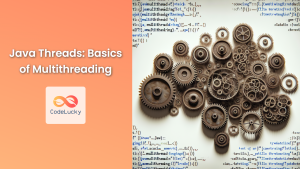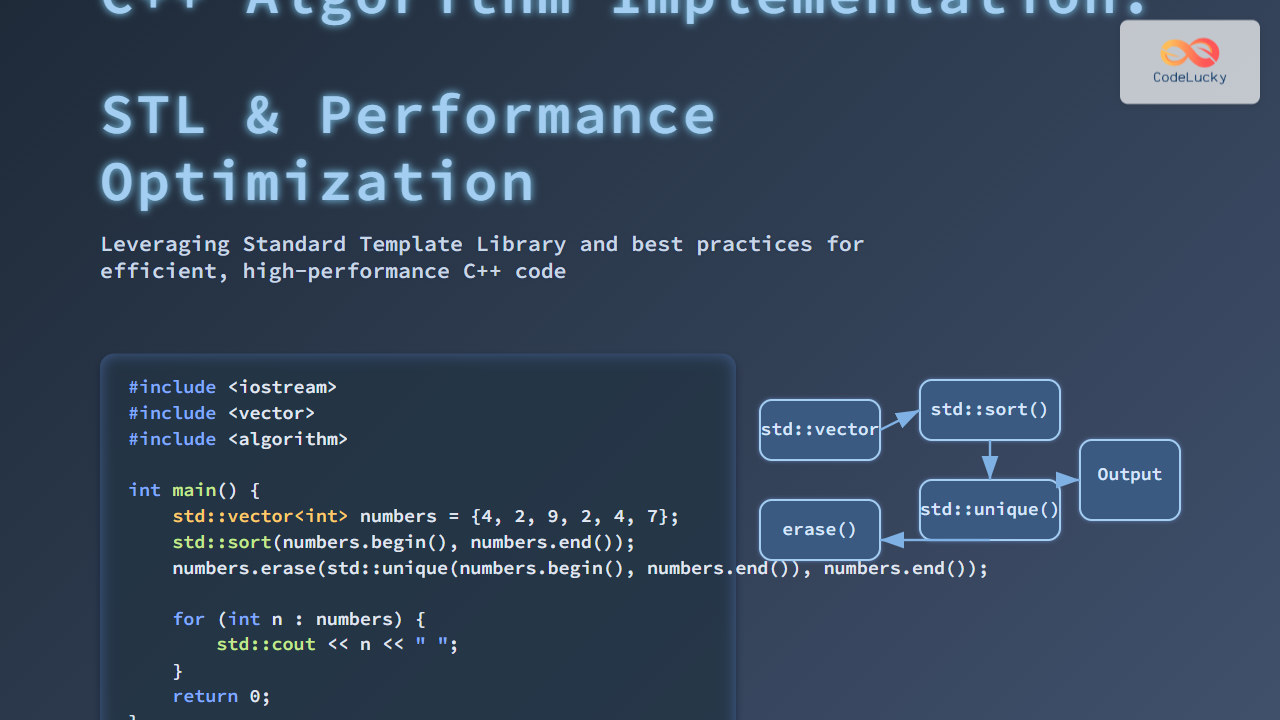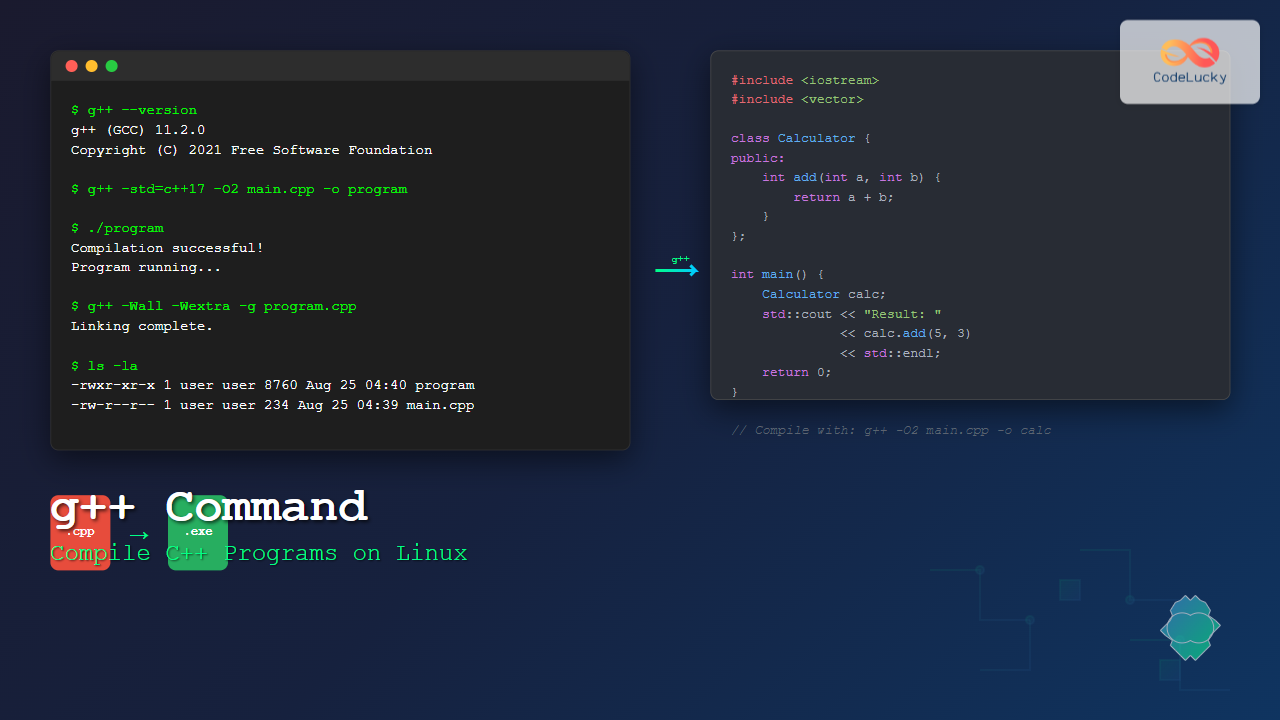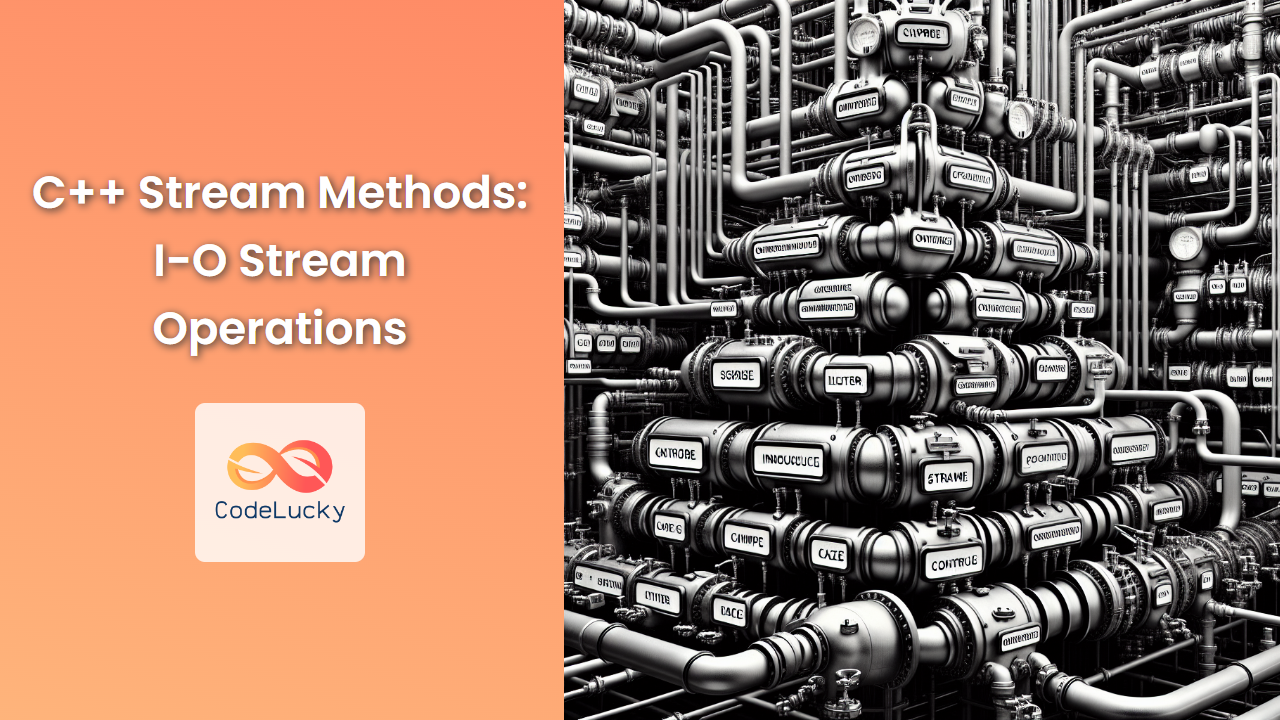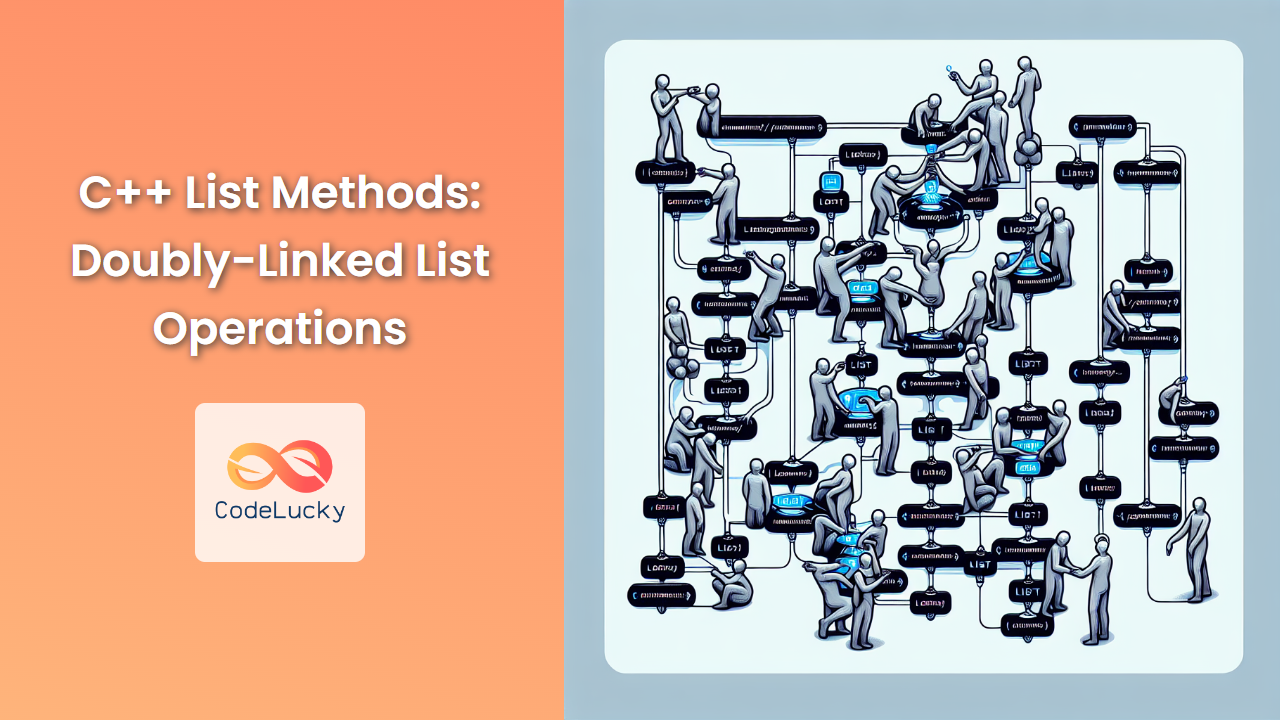In the world of multithreaded programming, effective communication between threads is crucial for creating efficient and robust applications. C++ condition variables provide a powerful mechanism for thread synchronization and communication. This article will dive deep into the concept of condition variables, their implementation in C++, and how they can be used to solve various concurrency problems.
Understanding Condition Variables
Condition variables are synchronization primitives that enable threads to wait for a specific condition to occur before proceeding with their execution. They work in conjunction with mutexes to provide a way for threads to safely wait for and signal changes in shared state.
🔑 Key features of condition variables:
- Allow threads to wait for a condition to become true
- Enable threads to notify other waiting threads when a condition changes
- Work in tandem with mutexes to ensure thread safety
The std::condition_variable Class
C++11 introduced the std::condition_variable class as part of the Standard Library. This class provides the core functionality for implementing condition variables in C++ programs.
Here's a basic example of how to declare and use a condition variable:
#include <condition_variable>
#include <mutex>
#include <thread>
std::condition_variable cv;
std::mutex mtx;
bool ready = false;
void worker_thread() {
std::unique_lock<std::mutex> lock(mtx);
cv.wait(lock, [] { return ready; });
// Do work when condition is true
}
void main_thread() {
{
std::lock_guard<std::mutex> lock(mtx);
ready = true;
}
cv.notify_one();
}
In this example, the worker thread waits for the ready flag to become true before proceeding. The main thread sets the flag and notifies the worker thread using the condition variable.
Waiting on a Condition
The wait() function is a key method of the std::condition_variable class. It allows a thread to wait until notified by another thread that a condition has changed.
There are two main forms of the wait() function:
wait(unique_lock<mutex>& lock)wait(unique_lock<mutex>& lock, Predicate pred)
The second form is particularly useful as it combines the wait with a predicate check, helping to avoid spurious wakeups.
Let's look at a more detailed example:
#include <iostream>
#include <thread>
#include <mutex>
#include <condition_variable>
#include <queue>
std::queue<int> data_queue;
std::mutex mtx;
std::condition_variable cv;
bool finished = false;
void producer() {
for (int i = 0; i < 10; ++i) {
{
std::lock_guard<std::mutex> lock(mtx);
data_queue.push(i);
std::cout << "Produced: " << i << std::endl;
}
cv.notify_one();
std::this_thread::sleep_for(std::chrono::milliseconds(100));
}
{
std::lock_guard<std::mutex> lock(mtx);
finished = true;
}
cv.notify_one();
}
void consumer() {
while (true) {
std::unique_lock<std::mutex> lock(mtx);
cv.wait(lock, [] { return !data_queue.empty() || finished; });
if (finished && data_queue.empty()) {
std::cout << "Consumer finished" << std::endl;
return;
}
int value = data_queue.front();
data_queue.pop();
std::cout << "Consumed: " << value << std::endl;
}
}
int main() {
std::thread t1(producer);
std::thread t2(consumer);
t1.join();
t2.join();
return 0;
}
In this producer-consumer scenario, the producer generates data and pushes it into a queue, while the consumer waits for data to become available before processing it. The condition variable is used to synchronize these actions.
Notifying Waiting Threads
Condition variables provide two methods for notifying waiting threads:
notify_one(): Wakes up one waiting threadnotify_all(): Wakes up all waiting threads
Here's an example demonstrating the use of notify_all():
#include <iostream>
#include <thread>
#include <mutex>
#include <condition_variable>
#include <vector>
std::mutex mtx;
std::condition_variable cv;
bool ready = false;
std::vector<int> results;
void worker(int id) {
std::unique_lock<std::mutex> lock(mtx);
cv.wait(lock, [] { return ready; });
// Simulate some work
results.push_back(id * 10);
std::cout << "Worker " << id << " finished" << std::endl;
}
int main() {
std::vector<std::thread> threads;
for (int i = 0; i < 5; ++i) {
threads.emplace_back(worker, i);
}
{
std::lock_guard<std::mutex> lock(mtx);
ready = true;
}
cv.notify_all();
for (auto& t : threads) {
t.join();
}
std::cout << "Results: ";
for (int r : results) {
std::cout << r << " ";
}
std::cout << std::endl;
return 0;
}
This example creates multiple worker threads that wait for a signal before starting their work. The main thread sets the ready flag and notifies all workers simultaneously using notify_all().
Avoiding Common Pitfalls
When working with condition variables, it's important to be aware of potential issues:
-
Spurious Wakeups: Always use a predicate with
wait()to guard against spurious wakeups. -
Lost Wakeups: Ensure that the condition is checked after acquiring the mutex but before calling
wait(). -
Deadlocks: Be cautious when using multiple mutexes to avoid deadlock situations.
Here's an example demonstrating how to properly handle these issues:
#include <iostream>
#include <thread>
#include <mutex>
#include <condition_variable>
std::mutex mtx;
std::condition_variable cv;
bool data_ready = false;
void prepare_data() {
{
std::lock_guard<std::mutex> lock(mtx);
// Simulate data preparation
std::this_thread::sleep_for(std::chrono::seconds(2));
data_ready = true;
}
cv.notify_one();
}
void process_data() {
std::unique_lock<std::mutex> lock(mtx);
cv.wait(lock, [] { return data_ready; });
std::cout << "Processing data..." << std::endl;
}
int main() {
std::thread t1(prepare_data);
std::thread t2(process_data);
t1.join();
t2.join();
return 0;
}
In this example, we use a predicate with wait() to guard against spurious wakeups, and we ensure that the condition is checked after acquiring the mutex.
Advanced Usage: std::condition_variable_any
For more flexibility, C++ also provides std::condition_variable_any, which can work with any lock type, not just std::unique_lock<std::mutex>.
Here's an example using a custom lock type with std::condition_variable_any:
#include <iostream>
#include <thread>
#include <mutex>
#include <condition_variable>
class CustomLock {
std::mutex& mtx;
public:
CustomLock(std::mutex& m) : mtx(m) { mtx.lock(); }
~CustomLock() { mtx.unlock(); }
void lock() { mtx.lock(); }
void unlock() { mtx.unlock(); }
};
std::mutex mtx;
std::condition_variable_any cv;
bool ready = false;
void worker() {
CustomLock lock(mtx);
cv.wait(lock, [] { return ready; });
std::cout << "Worker thread is processing" << std::endl;
}
int main() {
std::thread t(worker);
{
CustomLock lock(mtx);
ready = true;
}
cv.notify_one();
t.join();
return 0;
}
This example demonstrates how std::condition_variable_any can be used with a custom lock type, providing more flexibility in certain scenarios.
Performance Considerations
While condition variables are powerful, they can have performance implications in high-contention scenarios. Here are some tips to optimize performance:
- Use
notify_one()instead ofnotify_all()when possible to reduce unnecessary wake-ups. - Consider using atomic variables for simple flags to avoid the overhead of mutex locking.
- Be mindful of the granularity of your locks to minimize contention.
Here's an example comparing the use of a condition variable with an atomic flag:
#include <iostream>
#include <thread>
#include <mutex>
#include <condition_variable>
#include <atomic>
#include <chrono>
// Using condition variable
std::mutex mtx;
std::condition_variable cv;
bool ready = false;
void wait_for_flag_cv() {
std::unique_lock<std::mutex> lock(mtx);
cv.wait(lock, [] { return ready; });
}
void set_flag_cv() {
{
std::lock_guard<std::mutex> lock(mtx);
ready = true;
}
cv.notify_one();
}
// Using atomic flag
std::atomic<bool> atomic_ready(false);
void wait_for_flag_atomic() {
while (!atomic_ready.load(std::memory_order_acquire)) {
std::this_thread::yield();
}
}
void set_flag_atomic() {
atomic_ready.store(true, std::memory_order_release);
}
int main() {
// Test condition variable
auto start = std::chrono::high_resolution_clock::now();
std::thread t1(wait_for_flag_cv);
std::thread t2(set_flag_cv);
t1.join();
t2.join();
auto end = std::chrono::high_resolution_clock::now();
std::cout << "Condition variable time: "
<< std::chrono::duration_cast<std::chrono::microseconds>(end - start).count()
<< " microseconds" << std::endl;
// Reset flag
ready = false;
atomic_ready.store(false);
// Test atomic flag
start = std::chrono::high_resolution_clock::now();
std::thread t3(wait_for_flag_atomic);
std::thread t4(set_flag_atomic);
t3.join();
t4.join();
end = std::chrono::high_resolution_clock::now();
std::cout << "Atomic flag time: "
<< std::chrono::duration_cast<std::chrono::microseconds>(end - start).count()
<< " microseconds" << std::endl;
return 0;
}
This example compares the performance of using a condition variable versus an atomic flag for a simple synchronization scenario. The atomic flag approach may be faster for simple cases, but condition variables offer more flexibility and are better suited for complex synchronization needs.
Conclusion
Condition variables are a powerful tool in the C++ developer's toolkit for managing thread synchronization and communication. They provide a flexible and efficient way to coordinate the actions of multiple threads, especially in producer-consumer scenarios and other situations where threads need to wait for specific conditions to be met.
By mastering the use of condition variables, you can create more efficient and robust multithreaded applications. Remember to always use them in conjunction with mutexes, be aware of potential pitfalls like spurious wakeups and lost notifications, and consider performance implications in your specific use cases.
As you continue to explore multithreaded programming in C++, condition variables will undoubtedly become an essential part of your concurrency toolbox, enabling you to create sophisticated and efficient parallel algorithms and applications.


